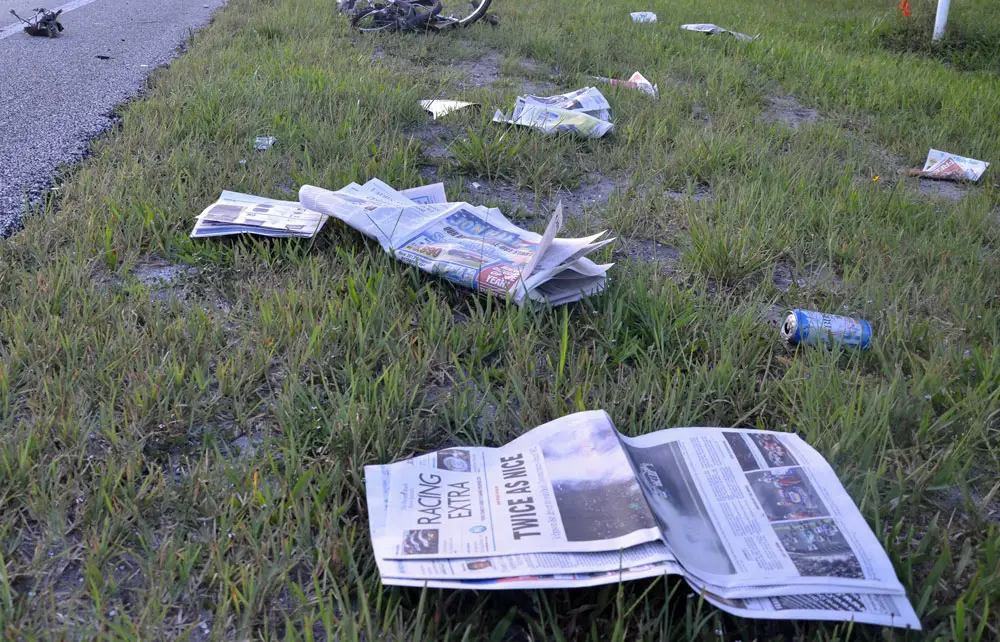
By Olivia Snow Smith
Though lacking the size and prestige of The New York Times or The Washington Post, The Storm Lake Times is arguably just as important.
Two years ago, the small, bi-weekly Iowa paper (circulation: 3,000) won the coveted Pulitzer Prize for taking on agricultural water pollution in the state. If it weren’t for vibrant local papers, stories like these might never come to light.
Unfortunately, all over the country, private equity and hedge funds have been scooping up these cash-strapped papers — and looting them into irrelevance or bankruptcy.
Here’s how it works.
Investors put down a fraction of the purchase price and borrow the rest — and then saddle the company with that debt. Layoffs and cutbacks follow, which leads to a shabbier product. Circulation and revenue decline, then more cuts, and the cycle accelerates.
Eventually the paper is a shadow of its former self, or turned to ashes completely. Wall Street wins, the public loses.
Perhaps the most infamous recent example was the breakdown of the 127-year-old Denver Post. Since private equity firm Alden Global acquired the paper, it has cut two out of every three staff positions — twice the industry rate for downsizing.
To add insult to injury, the firm has been using staff pension funds as its own personal piggy bank. In total, they’ve moved nearly $250 million into investment accounts in the Cayman Islands.
Employees who remain grapple with censorship. Last April, Dave Krieger — editorial page editor of Alden’s Boulder Daily Camera — was fired after self-publishing an opinion piece headlined “Private Equity Owners Endanger Daily Camera’s Future.”
 In solidarity, Denver Post editorial page editor Chuck Plunkett resigned, complaining that his publishers were also censoring stories that might offend Alden.
In solidarity, Denver Post editorial page editor Chuck Plunkett resigned, complaining that his publishers were also censoring stories that might offend Alden.
Alden’s Digital First Media runs many other big papers, putting hundreds of newsroom staff at risk of censorship and layoffs. Millions of readers, in turn, may learn only what Alden deems fit for them.
It’s not a new pattern. In 2008, a year after billionaire Sam Zell bought the Tribune Co. — publisher of the Chicago Tribune, Los Angeles Times, and other venerable publications — the company filed for bankruptcy, saddled with $13 billion in debt in what’s been called “the deal from hell.”
After it emerged from bankruptcy, the company was left in the hands of — you guessed it — private equity.
The march of these buyout barons continues. This summer, New Media Investment Group (owner of GateHouse Media) announced plans to buy Gannett. The $1.38 billion deal would unite one-sixth of all daily newspapers across the country, affecting 9 million print readers.
New Media anticipates cutting $300 million in costs each year, suggesting layoffs comparable to those at The Denver Post are in the offing — even as the company and its investor owners harvest profits.
This is a crisis. This country lost more than a fifth of its local newspapers between 2004 and 2018, while newspapers lost almost half of their newsroom employees between 2008 and 2018.
A few lawmakers are catching on.
Sens. Elizabeth Warren (D-MA), Tammy Baldwin (D-WI), and Sherrod Brown (D-OH) recently introduced the Stop Wall Street Looting Act to curb these abuses, with Warren specifically calling out private equity firms for decimating local newspapers.
Senator Bernie Sanders recently introduced an ambitious plan of his own, calling for a moratorium on major media mergers and encouraging newsrooms to unionize nationwide.
Newspapers have been critical to American democracy since its founding. By allowing huge corporations to gut newspapers in the name of making a buck, we’re putting a price tag on that democracy when we need it most.
![]()
Olivia Snow Smith is a recent graduate of Bard College and the communications intern for Take On Wall Street. This op-ed was adapted from TakeOnWallSt.com.





























Gary R says
Being employed back in the 70’s and 80’s in newspapers was a great place to work. You could get 70 to 80 hours per week and it was stable employment (never laid off). Then the Internet came out and hence the end of the newspaper industry. The Daytona News- Journal isn’t even printed on Sixth Street in Daytona Beach anymore.
Rick G says
For all intents and purposes the News-Journal is just a former shadow of itself. Sorry comment on current journalism.
Mary Fusco says
Rick G, Absolutely which is why I cancelled my subscription after 20 years. In all of my adult life, I have never not read the newspaper daily.
Bill says
Its because of “new” technology they are failing. Radio TV the 24 hour “news ” networks on pay TV and now the internet. one has many more options to gather information then a paper that tells you what happend yesterday.
Bill says
Today’s “news??”papers are not news (unless you consider 36-48 hour old stuff as news), but are mostly biased reports especially those offered by the Associated Press. Newspapers today have gotten exactly wheat they earned and promoted.
Born and Raised Here says
Who actually reads a newspaper ? I can get more info through my cell phone or lap top just at the touch or stroke of the keys, and it’s current, too.
mark101 says
Technology killed newspapers not Wall Street
TeddyBallGame says
Young people Don’t read or care about “news” because they know it’s become corrupted. They were raised being forced fed political correctness in school, that they all recognized as laughable and a lie, but a lie that charges a heavy price for questioning. So, the so called news, does not matter, never mind how honest or well intentioned. It does not matter.
The PC mainstream press has shat their own bed. And their profession.
2Dogs says
Today the news is still important but not the newspaper unless you like the way a certain paper cooks the news otherwise you have to read more than you should to get the full story.
Name the newspaper that does not spin the news to a liberal or conservative agenda and I’ll name you a successful newspaper
Roy says
Name one that spins right. WSJ maybe, name another.